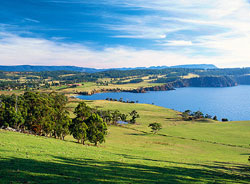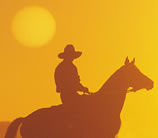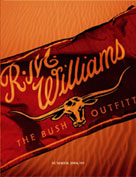OUTBACK STATIONS
 Reconciling with the past
Reconciling with the past
A Merino sheep station in a spectacular setting on Bruny Island is heralding better times ahead for indigenous Tasmanians.
Story and photos Tim Dub
“I love that smell,” says Bruce Michael, inflating his chest to better appreciate the unmistakable reek of countless sheep that falls, almost like a solid block, through the open doorway of the shearing shed. Before him is a scene of frantic activity; life on fast-forward.
Leaning through collar-shaped
harnesses suspended from the ceiling, eight shearers work intently with
rapid blows of their shears, each gripping an
immobilised Merino that, separated from its fleece like a banana from its
peel, is dragged away to be replaced a few moments later with a struggling
newcomer. Two shed-hands sweep constantly to retrieve any residues, while
the roustabout gathers a fleece and, with a great throw, unfurls it like
a blanket in front of the wool-classers at their bench. The initial impression
of chaos recedes as the rhythm of the process becomes apparent. From the
classers, the fleece goes to the bins, then on to be pressed into 200 kilogram
bales stored neatly against a far wall, en route to the mills and wool
factories of the world – in this case, Burlington, USA.
This is Murrayfield Station, with approximately 15,000 Merinos and 4000
hectares extending over a third of North Bruny, one of two islands connected
only
by a narrow isthmus that together comprise Bruny Island, off the south-east
coast of Tasmania. With 16 kilometres of coastline (and a boundary of similar
length bordering the river-like channel), rounded hills and forested reserves,
Murrayfield is a spectacularly beautiful property, as well as a place of
great historical significance. On this land, the wheel of history has very
nearly turned a full circle. ![]()
Full story OUTBACK Issue 37 October/November 2004


